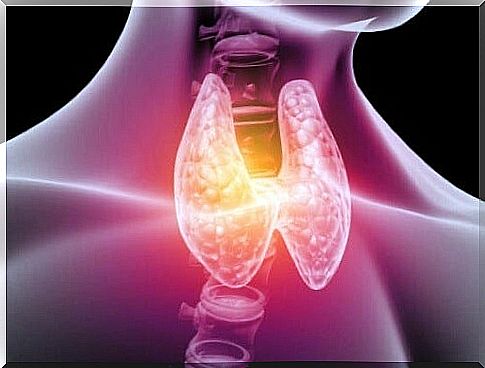Thyroid Gland Disorders: 7 Symptoms We Ignore

There are several red flags that can signal thyroid gland disorders that we often ignore. We usually trace them back to minor and transient problems like dehydration.
While there is nothing to worry about, it is important to recognize and take them into consideration, whether they evolve or disappear on their own.
Do you want to know what are the main signs that indicate thyroid gland disorders ? Then read on for all the details. Don’t miss them!
What is the thyroid gland?
The thyroid is a butterfly-shaped gland found in the neck, just above the collarbone. It is an endocrine gland that, in a nutshell, produces hormones that promote the functionality of the body
Thyroid hormones are responsible for regulating numerous activities in the body, from the speed of burning heat to the heartbeat. All of them make up the body metabolism.

Some signs that indicate disorders of the thyroid gland
When the thyroid is no longer able to function properly, some symptoms are likely to occur, although it depends a lot on the individual case.
Although it is true that in the initial stages they tend not to manifest, with the passage of time it is possible to perceive some signs of disorders in the thyroid gland.
1. Tiredness and short temper
Fatigue is one of the signs of thyroid gland disorders. We typically attribute it to everyday problems such as sleep deprivation, work and sports. However, it can also be caused by hypothyroid problems.
- If you suffer from hypothyroidism, you may experience a lot of tiredness and a certain lack of energy. In addition, problems with sleep, anxiety or short temper often arise.
2. Heart rate changes
Although hard to notice at first, changes in heart rate can be another sign of thyroid problems. To recognize this signal, it is good to remember that the normal pulse rate is between 60 and 100 beats per minute.
You may notice that your heart rate is too low or that the pace is noticeably faster for no apparent reason. It will be enough to pay more attention to the phenomenon.
3. Weight fluctuations

Sudden weight changes are another of the symptoms of thyroid disorders that we often ignore.
This is one of the most common symptoms. If you notice that you are gaining or losing weight in short periods of time and without any reason, contact your doctor; as this may indicate an imbalance of thyroid hormones.
4. Dry skin and brittle nails are among the symptoms of thyroid gland disorders
Dry skin and brittle nails are two signs that may indicate a thyroid problem and that we often associate with something else.
However, it should not be forgotten that dry skin and itching are manifestations of a malfunction of this gland. As are brittle and clearly streaked nails.
5. Bad regulation of body temperature
The thyroid also regulates body temperature. Disorders related to this gland can affect the body’s ability to regulate body temperature.
In this sense, people may feel too cold or too hot, in the latter case, resulting in excessive sweating and heat repulsion.
6. Nodules in the neck
Nodules in the neck are other visible signs that could make you think of a possible thyroid problem. If you notice it, see your doctor right away to check for any thyroid imbalance.
7. Muscle aches

Muscle aches are another symptom of hypothyroidism. Also, they can manifest as pains throughout the body.
These pains are usually caused by muscle swelling or lumps that oppress the nerves. If you notice them, see your doctor.
Do you suspect that you suffer from thyroid gland disorders?
If you suspect that you are suffering from thyroid problems, the most appropriate thing to do is to see your doctor for a check-up.
As you have seen, although these signals may provide some clues, they are still not sufficient to provide an exact diagnosis of the problem. Therefore, avoid self-diagnosis and even resort to self-medication. You have to take serious care of your health!









